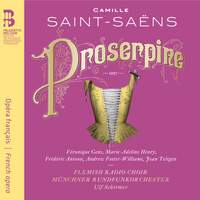Interview,
Véronique Gens on Proserpine
 Of the dozen or so operas by Camille Saint-Saëns, only Samson et Dalila has retained a significant foothold in the repertoire, so all power to the tireless folk at Palazzetto Bru Zane (the Centre for French Romantic Music, based in Venice) for their ongoing excavation of his lesser-known works for the stage; October saw the modern-day premiere of the composer’s 1887 ‘drame lyrique’ Proserpine, the tragedy of a Machiavellian courtesan in Renaissance Florence who plots the murder of her innocent love-rival but ends up conceding defeat and taking her own life. Given in concert at Versailles, the role of the ‘bloody beast’ (as Saint-Saëns described his bewitching title-character) was taken by Véronique Gens, who’s made quite a speciality of bringing the heroines of neglected French operas back to life over the past decade – her Tragédiennes series on Erato offers a comprehensive and compelling survey of heroines from Campra to Meyerbeer and Massenet, and her previous projects with Palazzetto Bru Zane include the first complete recordings of Félicien David’s Herculanum, Gounod’s Cinq-Mars, and Lalo/Coquard’s La Jacquerie (all available on Ediciones Singulares).
Of the dozen or so operas by Camille Saint-Saëns, only Samson et Dalila has retained a significant foothold in the repertoire, so all power to the tireless folk at Palazzetto Bru Zane (the Centre for French Romantic Music, based in Venice) for their ongoing excavation of his lesser-known works for the stage; October saw the modern-day premiere of the composer’s 1887 ‘drame lyrique’ Proserpine, the tragedy of a Machiavellian courtesan in Renaissance Florence who plots the murder of her innocent love-rival but ends up conceding defeat and taking her own life. Given in concert at Versailles, the role of the ‘bloody beast’ (as Saint-Saëns described his bewitching title-character) was taken by Véronique Gens, who’s made quite a speciality of bringing the heroines of neglected French operas back to life over the past decade – her Tragédiennes series on Erato offers a comprehensive and compelling survey of heroines from Campra to Meyerbeer and Massenet, and her previous projects with Palazzetto Bru Zane include the first complete recordings of Félicien David’s Herculanum, Gounod’s Cinq-Mars, and Lalo/Coquard’s La Jacquerie (all available on Ediciones Singulares).
In the lead-up to the release of Proserpine on Ediciones Singulares last week, I spoke to Véronique about the peculiar beauties of the score (generally regarded as Saint-Saëns’s most Wagnerian) and in particular its complex anti-heroine, why she feels such an affinity with the French tragic roles of the late nineteenth century, and her forthcoming solo album Visions (also produced in association with the Palazzetto Bru Zane and due out on Alpha at the end of June).
I find it incredible that such an attractive score has been unperformed for the best part of a century! Have you any thoughts as to whether this neglect came about due to musical reasons, dramatic concerns, economic factors - or all of the above?
I think it’s probably a combination of all of these things! Maybe the singers in the original production (or the maestro!) weren't good enough to do it justice - in all honesty, we have no idea, but it’s certainly very strange. But I like this kind of mystery and it makes it even more interesting to revive: it’s a great challenge to bring it back to life, and I personally really enjoy speculating about why music doesn't remain in the repertoire.
The booklet-notes mention that the composer had considerable difficulty in finding a singer to take on the title-role. What particular demands does it make of you as a performer?
Now, I don't want to imply that because I'm the only person who has sung this role these days that means that I’m the only one who can sing it! But every time [the Palazzetto Bru Zane] give me a new a score it’s a big discovery, and all of these roles tend to present the same kind of difficulties – the roles lie high one minute and low the next, there's lots of emphasis on text and intention, and always the same kind of characters (which I like very much anyway). They say my voice is a Falcon [a dark-toned soprano, named after the French singer Cornélie Falcon (1814-97)] and I think the vocality of many of the great singers of that time was very like this - things are different now, I don’t know why, but I feel that my voice is very well-suited to this kind of singing. I feel very comfortable with roles that range from high to low without 'attacking' either extreme, and which sit mainly in the middle of the voice: after all, this is the best place to enunciate the words, and in places it’s almost like talking. For women it’s more difficult than for men to be understood – for the words to really come across clearly when singing.
And how engaging a character do you find Proserpine herself? On the face of things she’s portrayed as a demonic femme fatale, but Saint-Saëns writes very sympathetically for her as well...
I don’t know if she’s nasty on purpose or only because she’s so sad and unfortunate! I think we should have pity on her – all these men are courting her, but she’s waiting for the man, and of course the man doesn’t exist, so she’s sending away all these poor guys who are coming and trying to be nice to her! I don't think she’s deliberately cruel: she's actually very sad and very lonely, and to some extent she's reaping what she sowed...She’s been behaving like this with men for so many years - but now she’s alone, she’s getting old, and the one man she really was in love with has left her. (Yes, she's another of these poor women who are abandoned by their men because they decide they want a younger woman!). I very much enjoy playing and singing these 'bad' women - it's just so interesting, and you can do so many things with your voice when you have these kinds of characters to sing. I remember when we performed it I was feeling so much sympathy for her by the end: she kills herself so that the man she adores is free to be with his new lover, and this is what finally redeems her. She is a poor thing, really.
Shades of the Marschallin in Der Rosenkavalier...
Yes, I thought the same as you: I think Proserpine’s lover is not as young as the Rosenkavalier, but it’s the same situation. The Marschallin isn’t as mean as Proserpine, though, and there is a political aspect and a sense of power-struggle in Proserpine that doesn’t exist in Rosenkavalier, I think.
Contemporary reviews placed a lot of emphasis of the influence of Wagner on Saint-Saëns in this piece. Do you feel very aware of that when you're singing this music, or does it still feel quintessentially French to you?
It certainly feels very big, very thick: big orchestra, big music, big sound, and this is maybe why people talk about Wagner...but so much of this Romantic French music from the nineteenth century is also scored for large orchestras and requires large voices (which I’m not sure I have!). Certainly you feel that you have to sing full voice when the whole orchestra is playing, otherwise you have no chance! I haven't sung a great deal of Wagner [Gens appeared as Eva in Die Meistersinger in 2009 at the Gran Teatre del Liceu], but I remember how much you have to give when the full orchestra is playing, and it's exactly the same with this music.
You have a solo album, Visions, coming out on Alpha shortly after the release of Proserpine. Can you tell me a little more about the repertoire for this disc?
Again, it was Palazzetto Bru Zane who found the music: in fact they gave me so much material that it was difficult to choose! We work together a lot: they trust me, I trust them, and it’s always a great pleasure. It’s really lovely to work with such enthusiastic people – they are made for this music, and do everything they can to revive it. The orchestra is always huge (three, four, five trombones!), and this is maybe one of the reasons we don’t programme and record this kind of music any more - it costs so much money, and now that many orchestras don’t have so many players you have to pay for extras. I hadn't even heard of some of these composers [Alfred Bruno, Abraham Louis Niedermeyer, Henry Février etc], so it was a real voyage of discovery, but I feel so comfortable with this music, and the same dramatic themes are always coming back.
This rather kitsch French style has always moved me very much – as I was singing these arias I was imagining the women experiencing these emotions, and you get a real sense that this was their reality, their life. The words are so powerful (take Massenet's aria portraying The Virgin lamenting her son: "I give my son as a sacrifice for humanity"): you have to really believe what you’re talking about, otherwise it just doesn’t make sense. I’m 150% into this music, and so sad that we don’t perform it any more: I don’t have the pretension to think that I’ll be the one who'll make it fashionable again, but I just want to be able to share the love I have for this repertoire! And I’m so grateful to the Palazzetto Bru Zane for helping me to finally find my voice: I’m not a soprano, I’m not a mezzo, I’m somewhere in between, and my voice fits this French nineteenth-century music so perfectly.
What do you have coming up, and do you have any more mainstream roles that you want to sing in the future?
In October I’m in Die Lustige Witwe – I did it in French a long time ago, in Lyons, but this time I’m doing it in German (including the dialogue!), at the Opéra Bastille. I don’t have many opportunities to sing in German so I’m very excited about this project: it's a great challenge, but also a great pleasure.
It must be a nice change to take on a comic role as well..!
Yes, definitely: I’ve specialised in all these broken heroines, and I don’t have so many opportunities to smile! But this Lustige Witwe will be very different and I can’t wait!
Véronique Gens's next project with Palazzetto Bru Zane is Fromental Halévy's La Reine de Chypre, which will be performed at the Théâtre des Champs-Élysées on Wednesday 7th June under the baton of Hervé Niquet and subsequently released on Ediciones Singulares.
Saint-Saëns: Proserpine
Véronique Gens (Proserpine), Marie-Adeline Henry (Angiola), Frédéric Antoun (Sabatino), Andrew Foster-Williams (Squarocca), Jean Teitgen (Renzo); Münchner Rundfunkorchester, Flemish Radio Choir, Ulf Schirmer
Proserpine was released on 19th May on Ediciones Singulares in association with the Palazzetto Bru Zane.
Available Formats: 2 CDs + Book, MP3, FLAC, Hi-Res FLAC
Visions is scheduled for release on Alpha on 23rd June
Available Formats: CD, MP3, FLAC, Hi-Res FLAC




